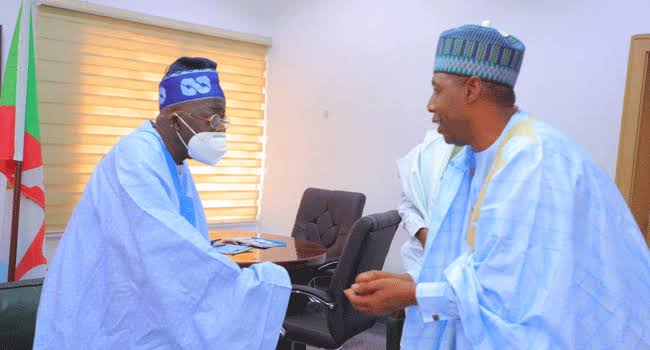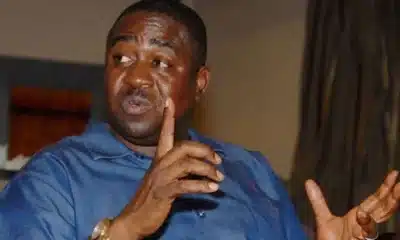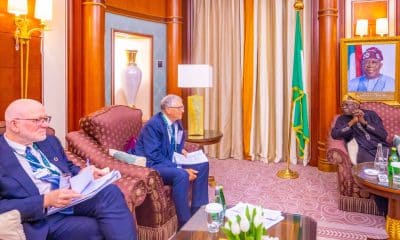Editorial
As Zulum Points Tinubu, Governors To Palliatives Post Subsidy Removal

There has been palpable evidence of the huge decline in Nigerians’ standard of living since May 29, 2023. This was the day when President Bola Tinubu declared in his inaugural address that the petrol subsidy is gone. This reverberating assertion was made even when no palliative measures have been instituted or thought out. No sooner had the President finished talking before the price of premium motor spirit in fuel stations across the country hit the roof. In time, the prices of goods and services went haywire, plunging even well-to-do Nigerians into poverty.
The dire situation was further worsened by the floating of the Naira towards the unification of the official and parallel market rates. Beyond what hitherto passed for the middle class, even the rich have been made poorer, no thanks to the steep reduction in the value of their disposable income. Six weeks down the line, the austerity is biting so hard that resident doctors are requesting a 550 per cent raise in their salaries to cushion the negative impact of fuel subsidy removal because “Our members now find it difficult to transport themselves to work and carry out other responsibilities required of them as medical doctors”.
While relaying recent policies of the federal government have affected Nigerians, the Nigeria Union of Journalists, Federal Capital Territory (NUJ-FCT), Abuja, noted that “Not a few workers in the public and private sectors are challenged commuting daily to their workplaces, while others have abandoned their places of meagre earning due to their inability to finance their transportation”. The body of newsmen added that “Intra-city transportation has recorded as much as 150% rise in some cases, thereby eating deep into the earnings of most Nigerians”.
As the saying goes, “If gold rusts, what shall the iron do?” Given how the government-imposed austerities are pounding supposedly comfortable Nigerians, what would be of the 133 million people already in multi-dimensional poverty? The World Bank estimated that the removal of subsidy on PMS, which caused a 300 per cent hike in the price of the product, could push as many as 7.1 million Nigerians into poverty. The Bank projects in its Nigeria Development Update (NDU) released Thursday in Abuja, that poor and economically-insecure households also face an equivalent monthly income loss of ₦5,700.
It is against the backdrop of these grim realities that Naija News lauds the thoughtfulness of the Borno State Governor, Babagana Zulum, in releasing 80 buses and pick-up vans for free transportation of farmers from their communities to farmlands. Addressing about 100,000 farmers in the state, the Governor explained that the 80 means of transport will comprise 50 luxurious buses to be allocated from the fleet of the Borno Express Corporation, while the 30 pick-up vans will be hired and provided by the state government. Such a companionate and considerate move is what is expected from the government at all levels at this austere time.
While the bulk of the responsibility falls on the federal government, the states also have a vital role to play as Governor Zulum has shown. There are multiplier effects to this intervention particularly in terms of guaranteeing food security and mitigating soaring prices of agricultural produce. State governments must identify where the subsidy removal bites their people the most and assuage them with adequate palliative measures. They’ve got to do this because the savings from subsidy payments aren’t to continue funding their ostentatious lifestyles but to do right by the people and improve their living conditions.
The Federal Government must lead this charge. It is now a month since President Tinubu directed the National Economic Council (NEC) led by Vice President Kashim Shettima to begin the process of providing palliatives. We are worried that this is yet to be achieved, leaving more and more Nigerians at the mercy of hunger and deprivation. We also recall that on the day this announcement was made public, a group of marketers led to a meeting with the President by Governor Dapo Abiodun said they will within the next 30 days donate 50 to 100, fifty-seater mass transit buses that would run on CNG, costing N100m each and N10bn cumulatively, to cushion the effect of the fuel subsidy removal.
Instead of empty promises and platitudes, long-suffering Nigerians deserve actual interventions like the one provided by Governor Zulum. If the government in one corner of the country can cater this way to the needs of the people, the government at the centre which took the decision in the first place should do better! Thankfully, the presidency didn’t spin the executive orders signed yesterday by the President to ease tax burden on businesses as targeted towards easing the crunch occasioned by the removal of fuel subsidies. It is definitely not; palliatives speak for themselves. Nigerians expect the sort of aid that reflects N400bn saved by the federal government in one four weeks as a result of the removal of subsidy on PMS. This is as the effect of the subsidy removal set in by the end of May although the payment of subsidy was expected to stretch until the end of June.
With the petrol subsidy removal among other reforms, the federal government is expected to achieve fiscal savings of approximately N2 trillion in 2023. These savings are expected to reach over 11 trillion naira by the end of 2025, meaning that funding the much-needed bail-out to citizens shouldn’t be difficult for the government. While this newspaper expects Tinubu to fulfill his pledge to repay sacrifices made by Nigerians with “massive investment in transportation infrastructure, education, regular power supply, healthcare and other public utilities that will improve the quality of lives”, his administration must move fast to provide immediate relief measures so that the people can live to reap long term reward of being denied fuel subsidy. Already, supporters of the President under the auspices of the League of Youth Voters for Tinubu and Shettima have come out to state that the “rise in the cost of living is unprecedented and unbearable” and that “the president is expected to revamp our ailing and critically dysfunctional economy”.
Former President Muhammadu Buhari’s recent disclosure that his government refused to remove subsidy on PMS in order for the people not to retaliate with their votes during the presidential election speaks to the level of attachment Nigerians have to this sole benefit they get from their country being oil producing. Nigerians have since realized since its removal that subsidy isn’t as toxic as was painted to be but was just the case of the government lacking the will to confront the corruption around it.
As citizens bear the brunt of the government’s failure to clean up the subsidy payment regime and shady dealings by oil marketers, the least that the government can do is ensure that vulnerable Nigerians are transparently compensated through handouts for the misery caused by the scrapping of fuel subsidy. Naija News however warns that the distribution of these palliatives must be devoid of corruption, politics, nepotism and other pandering to narrow interests.












